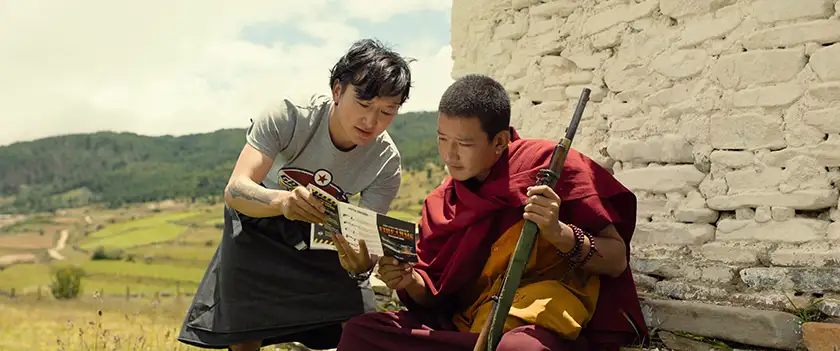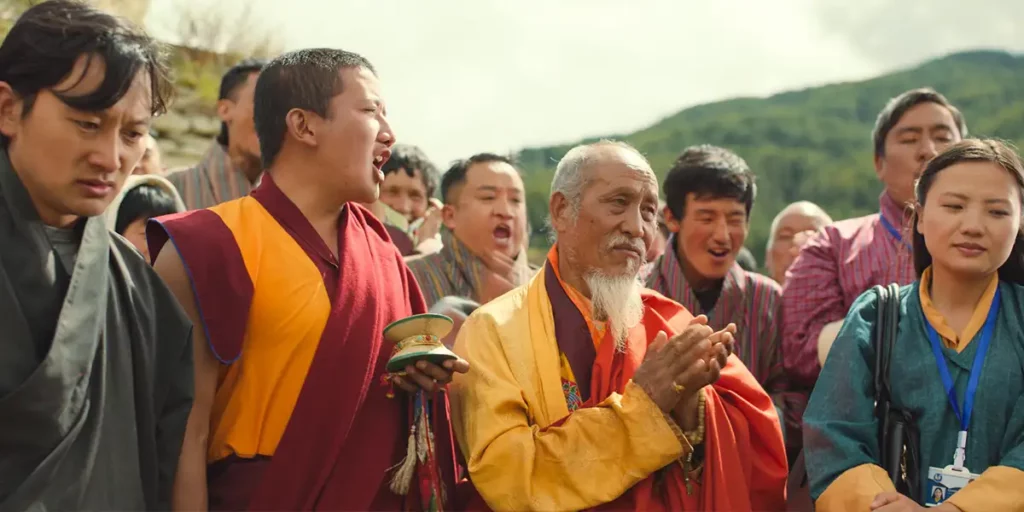In The Monk and the Gun, the establishment of one of the youngest democracies in the world is told in satirically amusing and biting ways.
Compared to other countries, the Bhutanese cinema industry is still very much in its emergent, younger phase; the first feature film from this landlocked country was Gasa Lamai Singye in 1989. One of the leading figures in this still blossoming era is Pawo Choyning Dorji, who returns with his second feature film The Monk and the Gun, following on from the Oscar-nominated success of Lunana: A Yak in the Classroom (2019). Slightly wider in scale than Lunana yet still maintaining that gorgeous, breezy charm, The Monk and the Gun reaffirms Dorji as a leading light in world cinema, a voice with a lot to say and a charming and unique way of delivering it.
The year is 2006. Bhutan is about to become the world’s youngest democracy. Dorji encapsulates the feelings of many Bhutanese people at this sudden societal change announced by their abdicating king by honing in on a small rural town called Ura. The residents face a mock election as a training exercise, unsure why this change is necessary, but this is, as one outsider points out, a chance that civilians in other countries would grab in an instant. The Monk and the Gun justifies its title by, you guessed it, a lama requesting two guns from his monk Tashi (Tandin Wangchuk) for mysterious reasons.
When an American gun collector (Harry Einhorn) shows up in town searching for said gun, we see Dorji’s satirical side flourish; The Monk and the Gun is as much a celebration and representation of Bhutan as it is a cutting treatise on Western influence and involvement. The film feels somewhat scattered initially, as Dorji flits from scene to scene too briskly as he introduces these characters, but when it finds its footing and they all converge on Ura, the results are terrific. Just like in Lunana, Dorji draws people with stunning realism and care, even in the often short scenes.

The Monk and the Gun perfectly captures why democracy—a given for so many countries in the world and an undeniable human right—was met with such trepidation in Bhutan. Dorji keenly observes the villagers’ reservations: they love the king, so why disrupt their lives that work so well already? As more come around to the idea, Dorji never loses sight of this genuine goodness inherent within the villagers; their opposition to democracy isn’t for any bad reason, rather it is a completely alien concept to them. Dorji expertly navigates this momentous event in Bhutanese history with aplomb, and also a decent dose of humour.
There is a swiftness to the comedy in The Monk and the Gun that makes every scene so watchable. Whether it’s a group of villagers marvelling at 007 in Quantum of Solace on a television set or a monk casually browsing a book of guns for sale, there is something marvellously simple about how Dorji observes such a colossal historical moment. He shows the strains, the dramas, and the tensions of it too, but never loses sight of the comedy nor human decency that is needed in this story.
Whilst not quite as compelling nor as refined as Lunana, The Monk and the Gun never loses dramatic impetus, especially in its fascinating climax. This is a film that grows stronger as it goes on, with Dorji more assured once each character has been introduced. The Monk and the Gun is a concise but formidable lesson in Bhutanese modern history, but moreover, it is a reminder that people can coexist peacefully, away from violence or evil. This symbolism takes on even more clarity in its finale, but it is a constant message throughout The Monk and the Gun, and for that reason alone, Dorji’s second feature should not be missed.
The Monk and the Gun will be released in US theaters on February 9, 2024.

